FICTION.
MISER'S MONEY.•
DARTMOOR is once- more the theme of Mr. Phillpotts' pen, but it is Dartmoor in a more genial aspect than in some of his earlier stories. The different veins of his talent, tragic and humorous, are here fused with happy results. Mr. Phillpotts is 4ot over- powered by his local knowledge, nor does he let his fancy run riot in word pictures. Miser's Money shows him at his mellowest and best as artist and observer.. It is a family history, in which two generations are chiefly concerned, dominated in his lifetime and for a good time after his death by the old unmarried farmer David Mortimer, miser, misogynist and cynic, whose wealth, passing into the control of the cleverest of his nephews, is purged of its malign influence largely owing to the influence and example of a good woman. The vivacious, audacious but moody Barry Worth is a most interesting character, so mixed that he came very near being undone by the dis3overy of his uncle's hoard. Barry's methods were irregular ; he had to pay conscience money ; but he made a clean breast of every- thing to his wife, and not only defrauded no one but greatly increased the value of the estate. Barry is, however, much less lovable than his brother James, a gentle, kindly creature who allowed himself to be robbed of his sweetheart from sheer irreso- luteness, but concentrated all the devotion of his nature on the neglected daughter whom she died for in bringing into the world. Yet if it had not been for his masterful brother, he would never • Mimes Money. By Eden Phillpotts. London : Heinemann. rls. 6d. net,' have adopted the child. Barry, though his methods were lacking in scruple, was the good genius of the family. The story is not, as in other Dartmoor tales from the same hand, a duel between mankind and an unkind destiny so much as a partial triumph over circumstance, heredity and example. Neither of the two brothers achieves perfect happiness, but the one comes very near it by conquering his acquisitiveness, the other in the vicarious discharge of paternal duty to the child of the woman he had loved and lost. There are tragic notes in the recital, but humorous relief abounds, and the dialogue is a constant refreshment. We must confine ourselves to one example. Barry's aunt Sarah yielded to " the lust of possessing treasures " and bought an American organ. After four years she presented it to her nephew on his birthday:— "'I never looked at it as a thing with secret powers of music in it, but more as property suitable to hand down in my will,' explained Sarah. ` And so you'd beat teach Rosy to view it,' she added to Barry, because from the music point of view it ain't what it was. I've looked to the outside of it and kept it so as you could see your face in it, and every note properly shining, too, but the innards are, of course, beyond my under- standing ; and it seems the damp air of White Works, and the lack of use, and one thing and another, have left their mark inside the machine. Mrs. Pascoe ran her hands over it last Sunday at my wish, and she broke to me that there was mis- fortunes happening inside by the sound. It makes a murmur like a coughing sheep ; and, for my part, I never did much like the noise of it at its best. But there 'tis—a fine upstanding piece of furniture so long as you leave it alone.' "



































 Previous page
Previous page